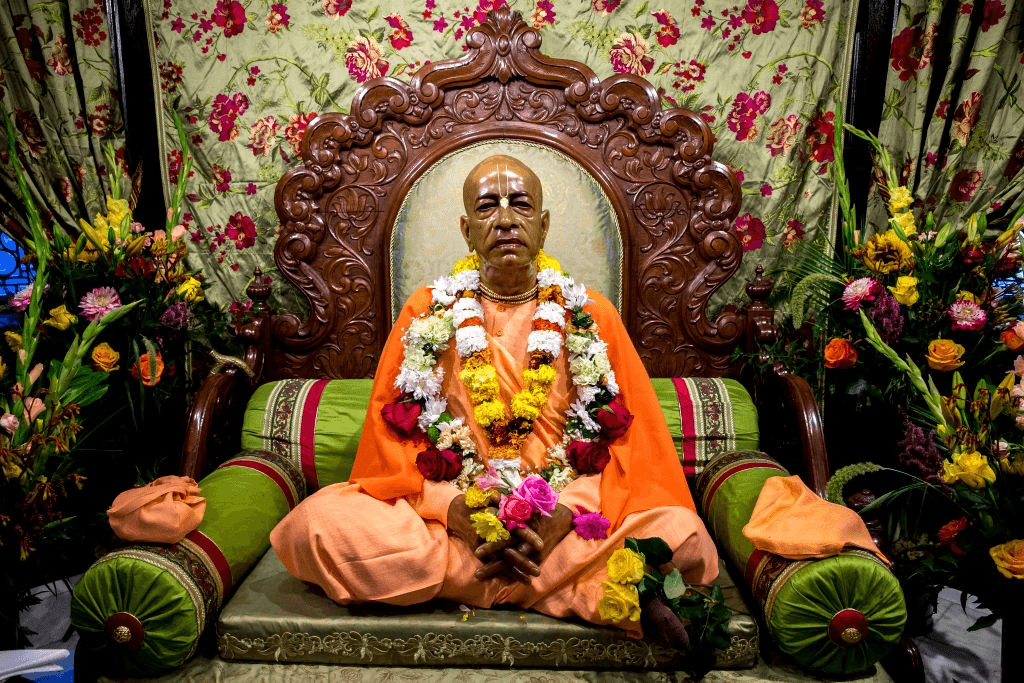A.C. Bhaktivedanta Swami Prabhupada founded the International Society for Krishna Consciousness (ISKCON), popularly known as the Hare Krishna movement, in 1966. The Bhakti tradition, which stresses love and devotion to God, is the foundation of ISKCON. With millions of adherents all through the world, the movement has become a worldwide phenomenon.
The Vedas, the earliest Indian literature, serve as a basis for ISKCON’s beliefs. The movement asserts that obtaining moksha, or liberation from the cycle of birth and death, is the ultimate aim of existence. This can be accomplished by following the path of loving devotion to God, or bhakti yoga.
Origins of ISKCON: A Vision of Spiritual Awakening



Prabhupada’s message resonated with many people who were searching for a more meaningful and spiritual way of life. ISKCON quickly grew in popularity, and by the early 1970s, it had established temples and centers in cities all over the world.
The movement’s teachings are based on the Bhagavad Gita, a Hindu scripture that teaches the importance of selfless service and devotion to God. ISKCON’s followers believe that the ultimate goal of life is to achieve moksha, or liberation from the cycle of birth and death. This can be achieved through bhakti yoga, or the path of loving devotion to God.
ISKCON’s practices include chanting the Hare Krishna mantra, following a vegetarian diet, and engaging in regular worship. The movement also has a strong emphasis on community service and social activism.
Philosophical Foundations: Bhakti Yoga and Divine Love
The philosophical foundations of Bhakti Yoga and Divine Love in ISKCON are based on the following concepts:
- Krishna is the Supreme Personality of Godhead, and the ultimate source of love and happiness.
- Love and devotion are the highest forms of worship.
- The path of Bhakti Yoga is open to everyone, regardless of their background or beliefs.
- The practice of Bhakti Yoga can help us to overcome the obstacles to love and happiness.
- Bhakti Yoga can lead to a state of divine union with Krishna.



The Joy of Devotion: Chanting the Hare Krishna Mantra
| Benefit | Description |
|---|---|
| Increased focus and concentration | Chanting the Hare Krishna mantra can help to focus the mind and clear away distractions. This can be helpful for students, professionals, and anyone who wants to improve their concentration. |
| Reduced stress and anxiety | Chanting the Hare Krishna mantra can help to reduce stress and anxiety. The repetitive nature of the mantra can be calming and soothing, and the focus on Krishna can help to take the mind off of worries and concerns. |
| Improved mood and well-being | Chanting the Hare Krishna mantra can help to improve mood and well-being. The mantra is associated with positive emotions such as love, joy, and peace. It can also help to boost self-esteem and confidence. |
| Deeper connection with Krishna | Chanting the Hare Krishna mantra is a form of devotion to Krishna. Over time, chanting can help to develop a deeper connection with Krishna and experience his love and guidance. |
| Sense of community | Chanting the Hare Krishna mantra is often done in a group setting, such as at an ISKCON temple. This can help to create a sense of community and support. |
| Spiritual growth | Chanting the Hare Krishna mantra can help to promote spiritual growth. It can help to purify the mind and heart, and open the door to higher states of consciousness. |
Temples and Community: Centers of Spiritual Engagement



- Chanting: ISKCON temples are places where people can come together to chant the Hare Krishna mantra. Chanting is a form of devotion to Krishna that is believed to have many benefits, such as reducing stress, improving focus, and promoting spiritual growth.
- Meditation: ISKCON temples also offer meditation classes and workshops. Meditation is another way to connect with Krishna and cultivate spiritual awareness.
- Deity worship: ISKCON temples house deities of Krishna and other Hindu gods and goddesses. Devotees come to the temples to offer prayers and worship to these deities.
- Food distribution: ISKCON temples often offer free food to the public. This is seen as a way to serve Krishna and help others.
- Community service: ISKCON temples are also involved in a variety of community service projects. This is seen as a way to apply the principles of Krishna consciousness in the world.
Global Outreach: ISKCON's Reach Across Continents
The International Society for Krishna Consciousness (ISKCON), also known as the Hare Krishna movement, was founded in New York City in 1966 by A.C. Bhaktivedanta Swami Prabhupada. What began as a small ashram has since grown into a global phenomenon, with temples, centers, and communities established on six continents. ISKCON’s message of love, devotion, and peace has attracted people from all walks of life, and the organization has been instrumental in bridging cultural and religious divides.
ISKCON’s teachings are based on the ancient Vedic scriptures of India, and its members practice a form of yoga called bhakti yoga, or yoga of devotion. They chant the Hare Krishna mantra, which is a call to the divine, and they engage in other spiritual practices such as meditation and kirtan, or congregational singing.
ISKCON has been involved in a variety of social and humanitarian projects, including food relief, disaster relief, and education. The organization has also been a vocal advocate for peace and understanding.
Conclusion: The Enduring Legacy of ISKCON
FAQs
full form of ISKCON is the International Society for Krishna Consciousness
International Society for Krishna Consciousness (ISKCON) is a religious movement that was founded in 1966 by A.C. Bhaktivedanta Swami Prabhupada in New York City.
International Society for Krishna Consciousness (ISKCON) was founded by A.C. Bhaktivedanta Swami Prabhupada in 1966. Born as Abhay Charan De in 1896 in Calcutta (now Kolkata), India,
International Society for Krishna Consciousness (ISKCON) was founded by A.C. Bhaktivedanta Swami Prabhupada in 1966 with several key objectives and purposes in mind.






